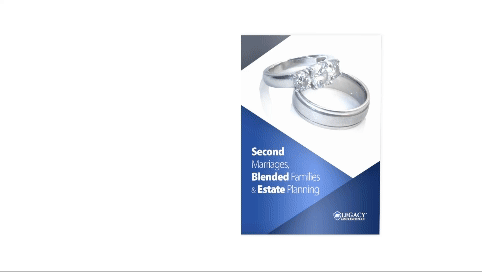If you have a blended family and live on a family farm, you’ll face a challenging mix of estate planning issues to consider to avoid family disputes, protect complex assets and ensure a smooth succession to the next generation. The saga of a Michigan farm family that unfolded over two decades offers a compelling example of the major difficulties that can arise when seemingly minor estate planning details are overlooked.
Larry E. Hutchinson and his wife, Joy, established a revocable living trust in 1998. Larry, who had five adult daughters from a previous relationship, named himself as the grantor and both himself and Joy as trustees. The trust included provisions for a Joy E. Hutchinson Trust to be created for Joy's benefit should Larry predecease her, with Larry's daughters named as remainder beneficiaries after Joy's death. The trust's assets included significant real estate holdings: the Family Farm and the Woodland Property.
The story took a turn in June 2004 when Larry passed away, leaving Joy as the successor trustee. For nearly a decade, the trust's management continued without issue. However, in 2014, Larry's daughters alleged that Joy had mismanaged the trust's assets. This allegation led to litigation, which was eventually resolved through a settlement agreement.
The settlement agreement required Joy to sell the Family Farm and convey the Woodland Property to Larry's daughters. When the Family Farm was sold, $30,000 of the proceeds went to the daughters' legal counsel, with the remainder going to Joy individually. With these distributions made, the case was administratively closed.
However, the story didn't end there. About a year later, following Joy's death, her estate's personal representative, Thomas Amor, filed a petition to reopen the case. This petition sought to transfer the Family Farm's mineral rights, which hadn't been included in the sale, from the trust to Joy's estate.
The ensuing legal battle shed light on a critical oversight in the settlement agreement. The probate court rejected the argument that the mineral rights were "proceeds" of the sale under the settlement agreement, finding instead that the agreement was silent on the ownership of these rights. The court ruled that the trust retained the mineral rights and that the original trust document should control their disposition.
This decision was upheld by the Michigan Court of Appeals, which agreed on several key points: The settlement agreement did not distribute the mineral rights, a material purpose of the trust (distributing these rights) remained unfulfilled, and therefore, the trust was not terminated and its provisions should govern the distribution of the mineral rights.
As a result of these rulings, the mineral rights were to be distributed to Larry's daughters as remainder beneficiaries of the trust, not to Joy's estate. This outcome underscores the importance of comprehensive estate planning, clear settlement agreements and thorough consideration of all assets, including those that might be easily overlooked, like mineral rights. The Hutchinson case serves as a cautionary tale for blended families and a reminder of the potential for long-lasting disputes in estate management.
What are the key components of a comprehensive estate plan?

A comprehensive estate plan is more than just a will or a trust – it's a carefully crafted strategy that addresses all aspects of your financial legacy. The Hutchinson case, which spanned nearly two decades, illustrates the importance of several key components.
- A well-structured trust. In August 1998, Larry and Joy Hutchinson established a revocable living trust, which can be an excellent tool for managing assets and avoiding probate. However, as their case shows, the effectiveness of a trust depends on proper management and clear instructions.
- Detailed asset inventory. One of the critical failures in the Hutchinson case was the oversight of the mineral rights associated with the Family Farm, an issue that wasn't discovered until after Joy's death, more than a decade after the trust was created.
- Clear succession plans. In blended families like the Hutchinsons, it's crucial to have clear plans for how assets will be distributed among current spouses and children from previous relationships.
- Trustee selection and oversight. The allegations of mismanagement against Joy Hutchinson, which came to light nearly 10 years after Larry's death in 2004, highlight the importance of choosing trustees carefully and establishing mechanisms for oversight.
- Regular reviews and updates. The mineral rights issue might have been caught and addressed if the Hutchinsons had regularly reviewed and updated their estate plan over the 18 years between its creation and the final court decision.
By ensuring that all these components are in place and regularly reviewed, you can create an estate plan that truly reflects your wishes and protects your legacy.
How can estate planning address the challenges of blended families?

The Hutchinson case is a prime example of the unique challenges that blended families face in estate planning. Larry Hutchinson's estate plan had to balance the interests of his current wife, Joy, with those of his adult daughters from a previous relationship. This situation is increasingly common in modern families and requires careful consideration and clear communication.
One effective strategy for blended families is to create separate trusts for different branches of the family. For instance, Larry could have established one trust for Joy's benefit during her lifetime and a separate trust for his daughters. This approach can help prevent conflicts by clearly delineating which assets are intended for which beneficiaries.
Another crucial aspect is clear communication of intentions. While we don't know the extent of Larry's communication with his family about his estate plan, the subsequent disputes that arose nearly a decade after his death suggest that there may have been misunderstandings or lack of clarity. Open discussions about estate plans, while potentially uncomfortable, can go a long way in preventing future conflicts.
Who should serve as successor trustee?

It's important to consider the role of the successor trustee, especially for blended families. In the Hutchinson case, Joy became the successor trustee upon Larry's death in 2004, which put her in a position of managing assets that would ultimately pass to her stepdaughters. This arrangement can create potential conflicts of interest. In some cases, it might be advisable to appoint a neutral third party as trustee to avoid such conflicts.
Ultimately, estate planning for blended families requires a delicate balance of providing for a current spouse while also ensuring that children from previous relationships are not unintentionally disinherited. The Hutchinson case underscores the importance of addressing these issues head-on in your estate plan.
Why is proper trust management crucial in estate planning?
The Hutchinson case provides a stark illustration of the importance of proper trust management. The litigation initiated by Larry's daughters in 2014, nearly 10 years after Larry's death, alleged that Joy had mismanaged the trust's assets. While the details of this mismanagement are not provided in the court documents, the mere existence of such allegations highlights the critical role that trustees play in estate planning.
Trustees have a fiduciary duty to manage trust assets in the best interests of the beneficiaries. This responsibility includes not only preserving the assets but also potentially growing them, depending on the terms of the trust. In the Hutchinson case, the trust included significant real estate assets – the Family Farm and Woodland Property – which require specialized knowledge to manage effectively.
Proper trust management also involves clear record-keeping and transparency. Had there been better oversight and transparency in the management of the Hutchinson trust over the decade following Larry's death, the disputes that led to litigation might have been avoided. This case serves as a reminder of the importance of selecting trustees carefully and potentially including provisions for independent audits or beneficiary reports in the trust document.
Moreover, the case highlights the need for clear instructions in trust documents. The dispute over mineral rights arose partly because the settlement agreement, reached after the initial litigation, was silent on this issue. A well-managed trust should have clear provisions for handling all assets, including those that might be overlooked in typical transactions.
What role do settlement agreements play in estate planning disputes?

The Hutchinson case provides valuable insights into the role of settlement agreements in resolving estate planning disputes. After the initial litigation over Joy's alleged mismanagement of the trust, which began in 2014, the parties reached a settlement agreement. This agreement stipulated the sale of the Family Farm and the distribution of its proceeds, as well as the transfer of the Woodland Property to Larry's daughters.
Settlement agreements can be an effective way to resolve disputes without the need for prolonged litigation. They allow parties to come to mutually agreeable terms and can often provide more flexible solutions than a court might impose. However, the Hutchinson case also highlights the potential pitfalls of settlement agreements if they're not drafted with sufficient care and foresight.
The key issue in this case was that the settlement agreement did not explicitly address the mineral rights associated with the Family Farm. This oversight led to further litigation after Joy's death, when her estate attempted to claim ownership of these rights. This dispute wasn't fully resolved until 2016, nearly two years after the initial settlement and almost 20 years after the trust was first created.
Conclusion
The Hutchinson case, which unfolded over nearly two decades, provides a wealth of lessons for anyone engaged in estate planning. It highlights the importance of comprehensive asset inventories, clear communication in blended families, proper trust management, careful handling of complex assets and meticulously drafted settlement agreements. By learning from the challenges faced by the Hutchinson family, we can create more robust estate plans that truly protect our legacies and provide for our loved ones.
Estate planning is not a one-time event but an ongoing process that requires regular review and updating. As our lives change, our assets grow or shrink, and our family dynamics evolve, so too should our estate plans.



